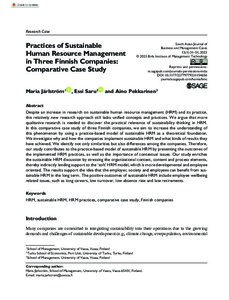Practices of Sustainable Human Resource Management in Three Finnish Companies: Comparative Case Study
Järlström Maria; Saru Essi; Pekkarinen Aino
https://urn.fi/URN:NBN:fi-fe2023052748854
Tiivistelmä
Despite an increase in research on sustainable human resource management (HRM) and its practice, this relatively new research approach still lacks unified concepts and practices. We argue that more qualitative research is needed to discover the practical relevance of sustainability thinking in HRM. In this comparative case study of three Finnish companies, we aim to increase the understanding of this phenomenon by using a practice-based model of sustainable HRM as a theoretical foundation. We investigate why and how the companies implement sustainable HRM and what kinds of results they have achieved. We identify not only similarities but also differences among the companies. Therefore, our study contributes to the practice-based model of sustainable HRM by presenting the outcomes of the implemented HRM practices, as well as the importance of contextual issues. Our study enriches the sustainable HRM discussion by stressing the organizational context, content and process elements, thereby indirectly lending support to the ‘soft’ HRM model, which is more developmental and employee oriented. The results support the idea that the employer, society and employees can benefit from sustainable HRM in the long term. The positive outcomes of sustainable HRM include employee wellbeing related issues, such as long careers, low turnover, low absence rate and late retirements. © 2023 Birla Institute of Management Technology.
Author keywords
comparative case study; Finnish companies; HRM; HRM practices; sustainable HRM
Kokoelmat
- Rinnakkaistallenteet [27094]
